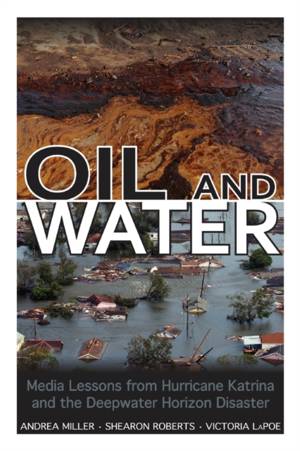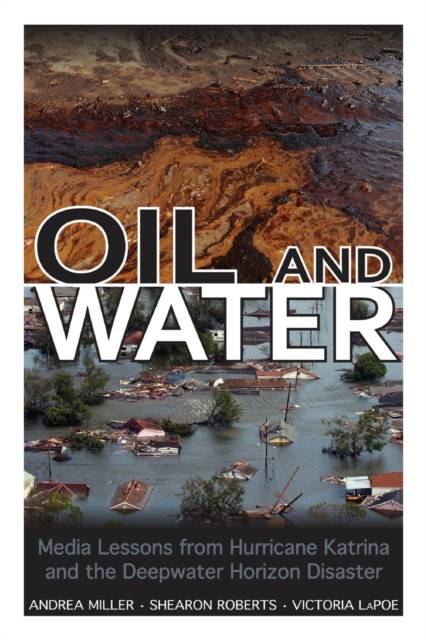
- Retrait gratuit dans votre magasin Club
- 7.000.000 titres dans notre catalogue
- Payer en toute sécurité
- Toujours un magasin près de chez vous
- Retrait gratuit dans votre magasin Club
- 7.000.0000 titres dans notre catalogue
- Payer en toute sécurité
- Toujours un magasin près de chez vous
Oil and Water
Media Lessons from Hurricane Katrina and the Deepwater Horizon Disaster
Andrea Miller, Shearon Roberts, Victoria Lapoe
Livre broché | Anglais
59,45 €
+ 118 points
Format
Description
HOW THE MEDIA HANDLED COVERAGE AND SHAPED UNDERSTANDINGS OF TWO MASSIVE AND ONGOING CATASTROPHES Along the Gulf Coast, history is often referenced as pre-Katrina or post-Katrina. However, the natural disaster that appalled the world in 2005 has been joined by another catastrophe, this one manmade--the greatest environmental and maritime accident of all time, the Deep Water Horizon Oil Spill. In less than five years, the Gulf Coast has experienced two colossal disasters, very different, yet very similar. And these two equally complex crises have resulted in a steep learning curve for all, but especially the journalists covering these enduring stories. In Oil and Water, the authors explore the media-fed experiences, the visuals and narratives associated with both disasters. Katrina journalists have reluctantly had to transform into oil spill journalists. The authors look at this process of growth from the viewpoints not only of the journalists, but also of the public and of the scientific community. Through a detailed analysis of the journalists' content, the authors tackle significant questions. This book assesses the quality of journalism and the effects that quality may have on the public. The authors argue that regardless of the type of journalism involved or the immensity of the events covered, successful reportage still depends on the fundamentals of journalism and the importance of following these tenets consistently in a crisis atmosphere, especially when confronted with enduring crises that are just years apart. ANDREA MILLER, Geismar, Louisiana, is associate dean for undergraduate studies and administration at the Manship School of Mass Communication at Louisiana State University. Her work has appeared in many journals. SHEARON ROBERTS, New Orleans, Louisiana, is a native of Trinidad and a Latin American studies instructor and doctoral candidate at Tulane University. She contributed to Covering Disaster: Lessons from Coverage of Katrina and Rita. VICTORIA LaPOE, Bowling Green, Kentucky, is an assistant professor at Western Kentucky University. She is the author of the book American-Indian Media: The Past, the Present, and the Promise of Digital.
Spécifications
Parties prenantes
- Auteur(s) :
- Editeur:
Contenu
- Nombre de pages :
- 210
- Langue:
- Anglais
Caractéristiques
- EAN:
- 9781496804648
- Date de parution :
- 01-10-15
- Format:
- Livre broché
- Format numérique:
- Trade paperback (VS)
- Dimensions :
- 152 mm x 229 mm
- Poids :
- 308 g

Les avis
Nous publions uniquement les avis qui respectent les conditions requises. Consultez nos conditions pour les avis.






